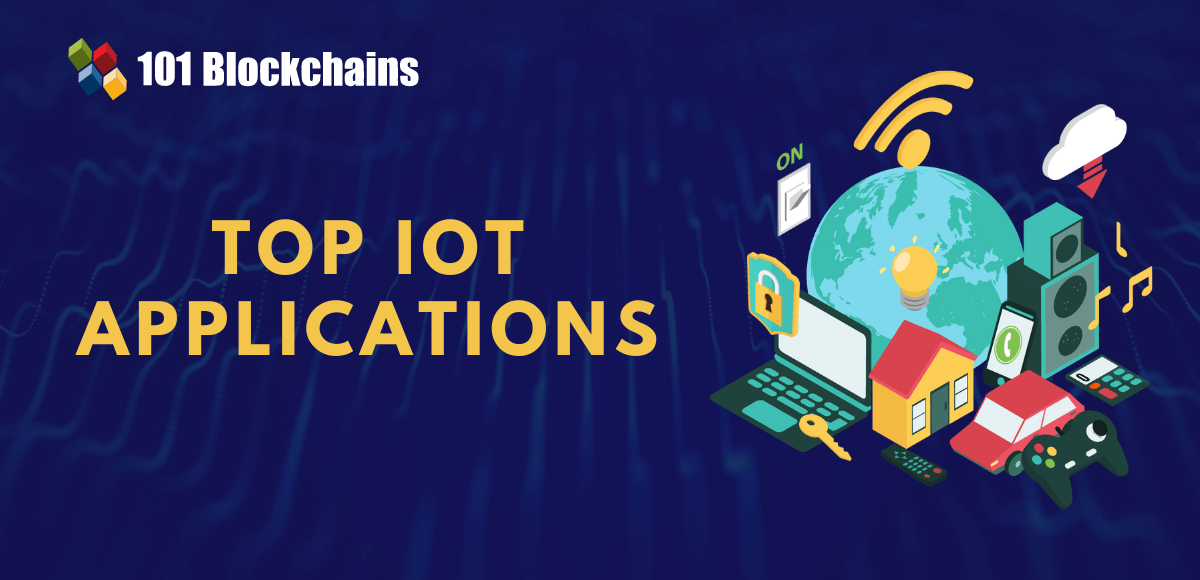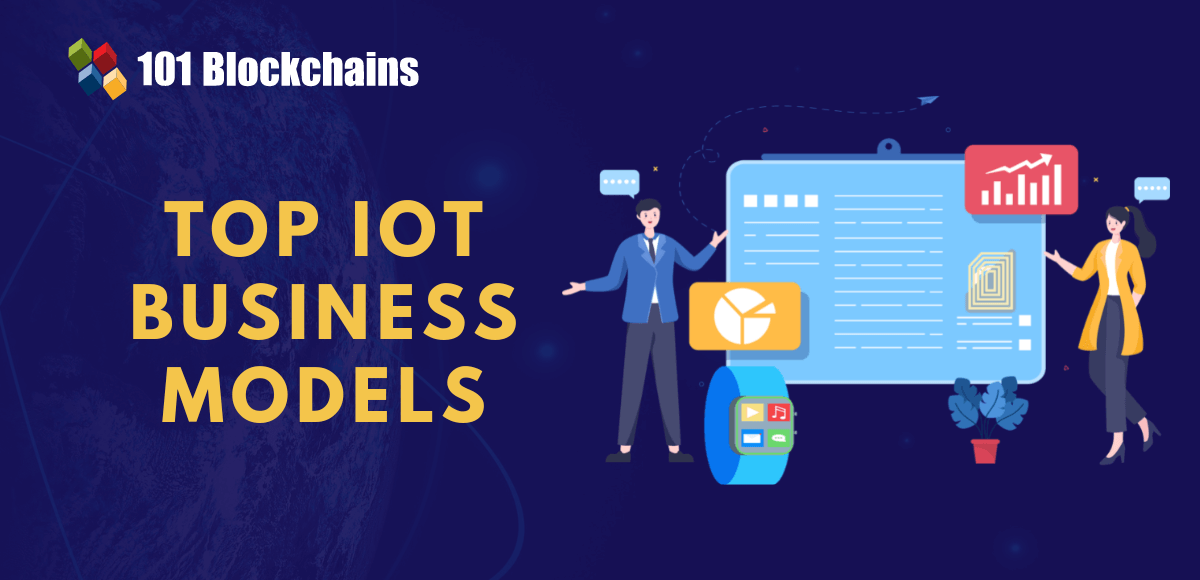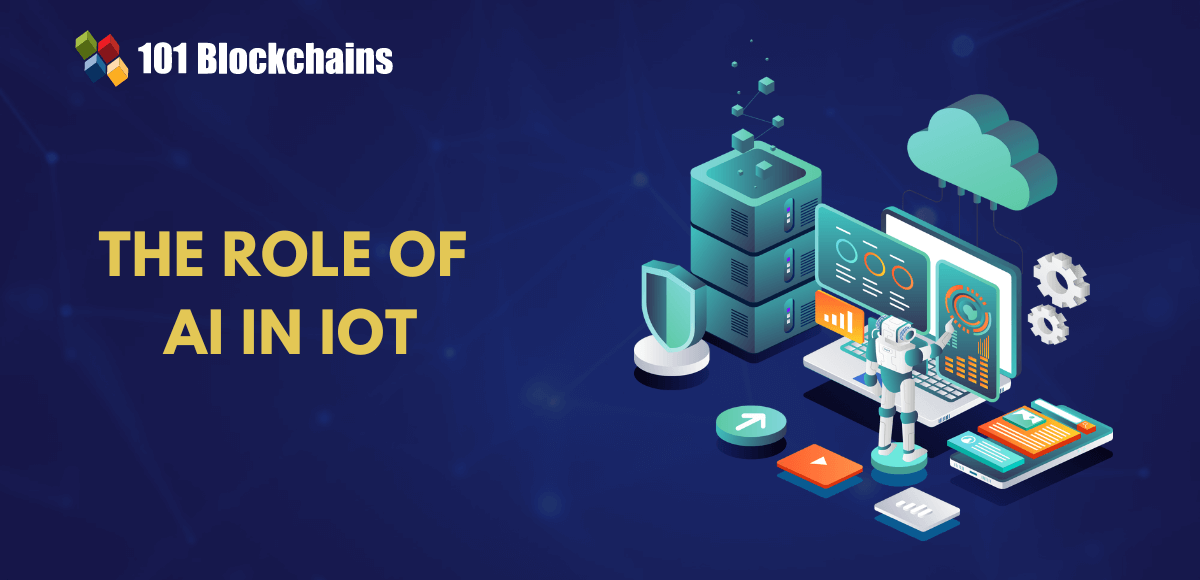Learn how blockchain truly works, master key definitions, and uncover what makes smart contracts so "smart." Dive into the fundamentals, gain valuable insights, and start your blockchain journey today!
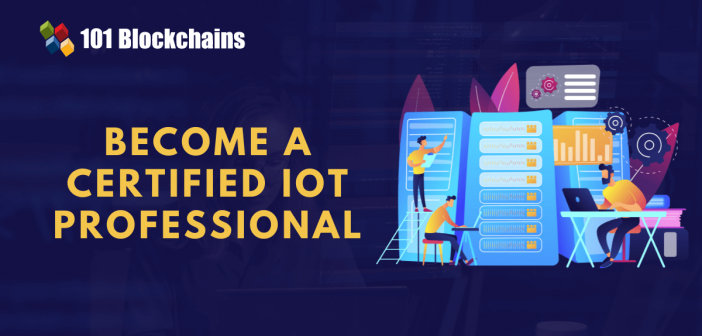
- IoT
James Howell
- on July 11, 2023
How to Become a Certified IoT Professional?
The beneficial outcomes of IoT or Internet of Things technology have emerged as crucial highlights that could help businesses and individual users. It is important to look for opportunities to become certified IoT professional with the consistently expanding use cases of IoT. The staggering growth in the number of IoT devices connected worldwide would lead to the installation of around 43 billion IoT-connected devices in 2023.
Internet of Things has come up with new prospects for skilled professionals and engineers. As the demand for IoT professionals continues increasing, the discrepancy between demand and supply will expand further. Almost 47% of businesses have to outsource their IoT projects as they do not have the right people to address IoT job responsibilities.
The existing IoT landscape has multiple career opportunities for a Certified IoT expert or trained professional. You can notice how the number of IoT-connected devices has been increasing, thereby signaling broader adoption of IoT. Internet of Things technology is still in the nascent stage and has shown valuable potential for transforming different industries. Let us learn more about the important pointers for building your career as an IoT professional in the following post.
Why Should You Look for a Career in IoT?
The first thing you need to check before pursuing a professional role in IoT industry would point out the reasons for same. Will a career in IoT offer the career benefits you have always imagined about? You can pursue an IoT course and certification by investing resources and efforts. However, it is also important to know whether the course and certification will help your IoT career. A single decision can decide the course of your future, thereby implying the need for caution when choosing opportunities for a career as an IoT professional.
One of the most important reasons to look for career opportunities in IoT would refer to the novelty of IoT. The career of a Certified Internet of Things professional would offer long-term options for improving career development prospects. You can learn about IoT and explore different job roles as an IoT professional alongside ensuring job security.
Internet of Things has come up with an effective answer for using embedded sensors that can help in exchanging information. Take a look at the ways in which smart cameras can offer better results in remote monitoring of your home. Similarly, wearable devices can work by tracking and storing relevant health information about individuals in a customized profile.
Want to understand the fundamentals of the Internet of Things (IoT)? Enroll Now in IoT Fundamentals Course!
Market Outlook for IoT
The global IoT market could be worth almost $1.1 trillion by 2023, implying that businesses would seek reliable alternatives for adopting IoT. At this point of time, the IoT market has emerged as a promising complement to industrial operations. Candidates want to become IoT expert with fluency in the different ways for employing IoT solutions in industrial use cases. The industrial use cases of IoT devices are visible in examples such as pressure sensors in oil and gas pipelines.
The pressure sensors can ensure the benefits of remote monitoring, while moisture sensors can offer better tracking of water levels. Internet of Things solutions aim at resolving many of the existing problems across multiple industries. Therefore, the applications of IoT across different sectors would gradually gain the top spot among strategic priorities of leaders.
Many candidates interested in IoT job opportunities would have doubts regarding the sustainability of their careers in the field of IoT. Will you have a long-term and secure career in IoT? The answer is most likely to point you toward the different industries in which IoT has generated job opportunities.
As a certified IoT expert, you can look for employment opportunities across different industries, such as software development and embedded system cybersecurity. The noticeable industries which have been leveraging the value of IoT include manufacturing, consumer products, agriculture, healthcare, transportation, and utilities. You can expect the number of jobs in IoT to grow by significant margins in the future.
Expand your knowledge of IoT with comprehensive IoT Flashcards explaining terms and technologies,
What Types of Jobs Are Available for Certified IoT Professionals?
The skills of a certified professional in Internet of Things technology can provide the right ingredients for pursuing reliable career paths. Do you want to prepare for an IoT certification course and become a certified expert? You must have a clear impression of how you can choose different career options based on your expertise in IoT. Here are the popular career roles you can explore in the domain of IoT as a certified professional.
-
IoT Developer
The first and most common role in the domain of IoT refers to IoT developer, who has to create applications that dictate the functionality of devices. IoT developers can use programming languages and standard APIs to create new IoT solutions with crucial value advantages.
You should note that the efforts to become certified IoT professional can lead you toward the practical responsibilities of developers. IoT developers have to supervise the development of software required for supporting IoT applications. In addition, the tasks of IoT developers also involve the use of software tools for managing large repositories of data alongside leveraging algorithms for data analysis.
-
IoT Architect
The next popular job role for certified experts in the field of IoT is that of IoT solutions architect role. IoT solutions architects must take responsibility for defining the broader strategy of the company for adopting IoT technology. The job of IoT architects focuses on creating and implementing strategies involving design of IoT sensors, actuators, and platforms. Most important of all, the scope of responsibilities in the role of an IoT solutions architect also includes references to high-level design of IoT architectures.
-
IoT Solutions Engineer
Another prominent job role you can identify in the IoT landscape is the IoT solutions engineer role. The functionalities of IoT networks allow the flexibility for customization to address a wide variety of needs. You can complete an IoT certification course and seek opportunities for creating new solutions from existing technologies.
The responsibilities of an IoT solutions engineer focus on working with customers to identify the important requirements of IoT solutions that could address their requirements. IoT solution engineers must rely on a technical approach for identifying the types of wireless technology, sensors, and other components.
Want to learn about the important skills required for becoming an IoT engineer? Read here Top 10 Essential Skills Required To Become An IoT Engineer
-
IoT Embedded Systems Designer
The embedded systems designer role in the IoT landscape is also another promising opportunity for certified IoT experts. You can become an embedded systems designer in IoT with an in-depth understanding of microprocessors, sensors, and software required for IoT applications.
Candidates can become IoT expert and look for exclusive career opportunities in designing device-specific embedded devices. IoT embedded systems designers have to work on the hardware with their in-depth knowledge regarding the devices which would use the embedded systems.
What Skills Do You Need to Become IoT Professional?
The tag of ‘IoT Professional’ in the resume of a candidate is not an easy achievement. You have to invest your efforts and time in learning crucial IoT skills which validate your role as a professional IoT expert. Do you want to pursue an IoT course and certification for a lucrative career in IoT? If yes, then you need to learn the following skills to become a certified professional in IoT.
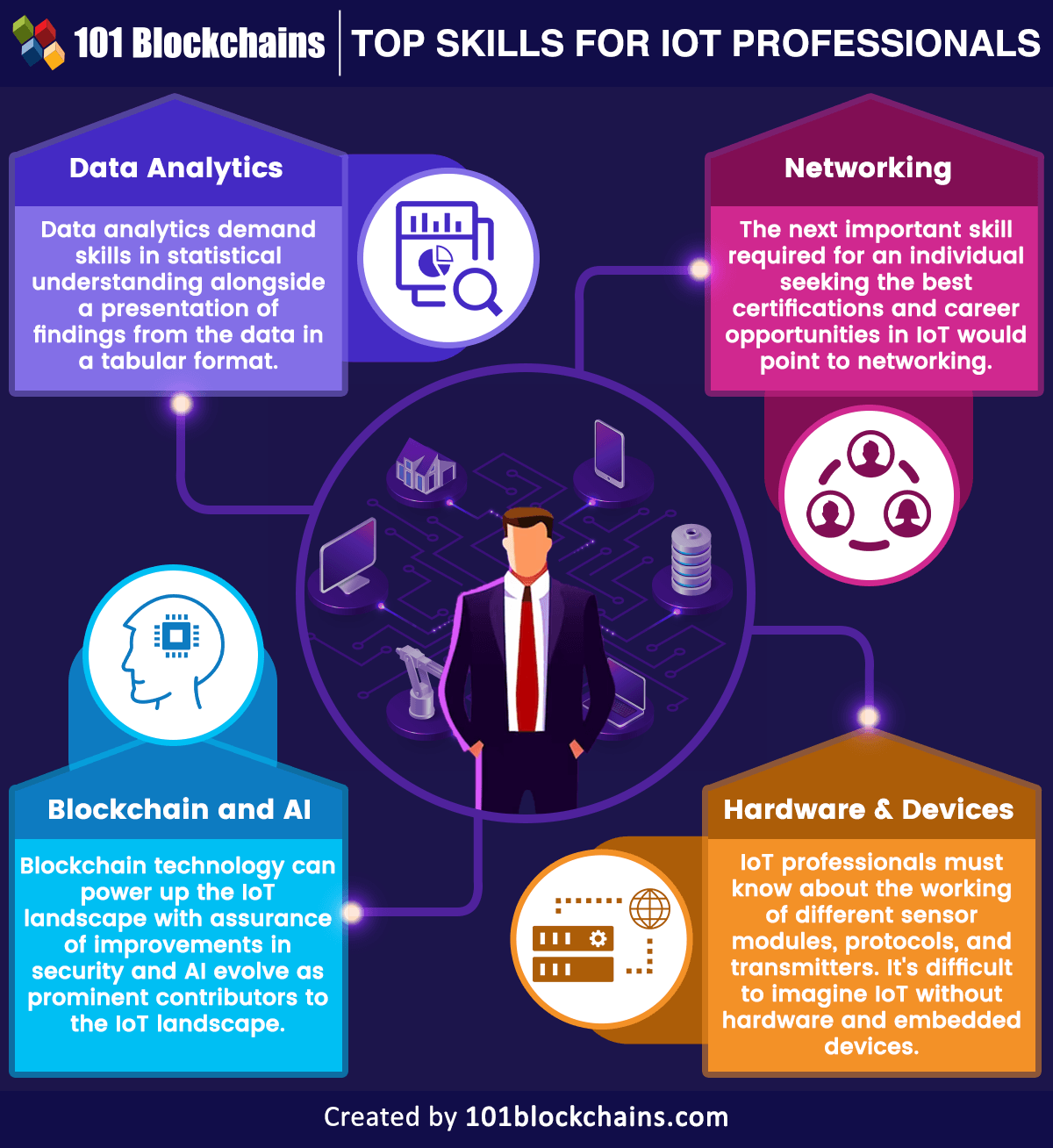
Please include attribution to 101blockchains.com with this graphic. <a href='https://101blockchains.com/blockchain-infographics/'> <img src='https://101blockchains.com/wp-content/uploads/2023/06/Top-Skills-for-IoT-Professionals.png' alt='top skills for iot professionals='0' /> </a>
-
Data Analytics
One of the significant highlights of the IoT market is the opportunity to access and use massive treasures of data. As a matter of fact, the basic objectives of IoT revolve around obtaining desired insights from data collected through IoT devices. Therefore, you should look beyond an IoT certification and seek opportunities to improve your skills as an IoT professional.
The important skills in data analytics demand skills in statistical understanding alongside a presentation of findings from the data in a tabular format. Candidates would require statistics-based languages alongside fluency in Python libraries for IoT professional roles.
Start learning IoT (Internet Of Things) with World’s first IoT Skill Path and understand how it’s related to the blockchain with industry experts Now!
-
Networking
The next important skill required for an individual seeking the best certifications and career opportunities in IoT would point to networking. You can notice how massive chunks of wires and sensors in IoT networks can lead to complexity. As a Certified Internet of Things Professional, you must have an in-depth understanding of IoT networking fundamentals. Most important of all, you should have the capability to design efficient network architectures which follow all communication protocols.
-
Hardware and Devices
The list of skills demanded by IoT professionals would also point to hardware and devices. You can find it difficult to imagine IoT without hardware and embedded devices. Organizations have to adjust their devices to accommodate suitable networks which would work according to the desired objectives. IoT professionals must know about the working of different sensor modules, protocols, and transmitters. Furthermore, IoT professionals must also learn about integrators and other new updates in the IoT hardware stack.
-
Blockchain and AI
The two most revolutionary technologies which can revolutionize the existing state of IoT include blockchain and AI. Blockchain technology can power up the IoT landscape with assurance of improvements in security. The responsibilities of a Certified IoT Professional would point to the ways in which an IoT professional should use new technologies to improve the value of IoT.
Blockchain can provide an effective solution for safeguarding massive loads of user data from unauthorized access. On top of it, AI and ML would evolve as prominent contributors to the IoT landscape for enhancing the possibilities to obtain relevant insights from IoT data.
Build your identity as a certified blockchain expert with 101 Blockchains’ Blockchain Certifications designed to provide enhanced career prospects.
Best Practices for Becoming Certified IoT Professionals
The scope for career development as an IoT professional is a clearly visible reason for pursuing a career in IoT. However, it is also important to identify the path to achieving your career objectives. Here is an outline of the pointers recommended by experts for pursuing a career in IoT.
-
Know the Skills You Have to Learn
The first thing you need to learn before pursuing an IoT certification to become a certified professional is the list of skills required for the job. A clear impression of your planned career path and objectives can serve as vital support for determining the type of skills you need. Some of the prominent mentions among the skills required for IoT professionals would include cloud computing, AI, blockchain, and data analytics. These essential skills are useful for marking a distinct highlight in the portfolio of an IoT professional.
-
Learn from a Technical Perspective
One of the most important elements that can help you achieve the skills of a certified IoT expert is to learn IoT from a technical perspective. Smart embedded devices serve as the foundation blocks of IoT networks. IoT professionals need to learn how to build IoT architectures from scratch, learning from a ‘device-first’ approach. The ability to visualize IoT system architectures on the basis of technical specifications of IoT hardware and devices can help you create innovative IoT solutions.
-
Importance of Training Courses and Certifications
The final and most important requirement to become certified IoT professional is a ‘certification.’ In addition, you need to learn the basics of IoT and the technology stack underlying IoT networks with comprehensive training courses. The search for reliable IoT training courses and certifications can lead you to multiple destinations.
However, you should be careful about choosing training courses and certifications so that the learning outcomes can help you gain fluency in IoT. The practical examples of IoT applications and solution architectures could help you familiarize yourself with the technical aspects of creating IoT solutions.
Furthermore, you should also pay attention to the dedication required for completing IoT course and certification objectives. Employers are more likely to trust a certified candidate with IoT expertise rather than uncertified candidates. The certification not only recognizes your skills but also shows your dedication to IoT.
Want to familiarize yourself with the technology stack associated with IoT? Enroll Now in Internet Of Things (IoT) – Intermediate Level Course!
Conclusion
The journey of pursuing a career in IoT can start with a simple training course. Over the course of time, you can come across different topics in IoT fundamentals and learn about the value of IoT for business. You should also learn the best practices to become IoT expert and follow the important recommendations by IoT experts for your career. The best thing about IoT career paths is the opportunity to seek long-term career development benefits. Find more information about IoT career development with a reliable training course provider right now.




